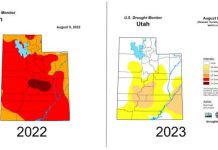SALT LAKE CITY, Utah, June 8, 2020 (Gephardt Daily) — Officials with the Utah Division of Wildlife Resources are offering safety tips to residents who might encounter a bear this summer.
Black bears are the only bear species currently in Utah, said a news release from the DWR.
“Even though they’re incredibly strong and surprisingly fast, black bears will typically do everything they can to avoid people,” Darren DeBloois, Utah Division of Wildlife Resources game mammals coordinator, said.
“When a bear finds food, though, that all changes. Once it finds food, a bear will often become aggressive toward anything it perceives as threatening the area where it found the food. That includes people. We are anticipating another summer with a lot of bear activity, so please take the necessary steps to protect yourself from a bear encounter.”
Here are a few tips to keep both you and the bears safe while you are out recreating in their territory this summer:
Bear-proof your food and supplies
Store your food, snacks and scented items, such as deodorant and toothpaste, in an area where a bear can’t get to them. Do not leave them out on tables or keep them in your tent. Storing them in a locked trailer or locking them in the trunk of your car are both good options. Storing food and scented items in these areas will reduce the chance that a bear smells them. And, if a bear does make its way to the area where you’re staying, if it isn’t rewarded with food, it will likely move on.
Keep your cooking area clean
After you’ve finished eating, thoroughly clean utensils and anything else that was used to prepare or eat the food. Don’t dump oil or grease from pots or pans onto the ground. Instead, put the oil or grease in a container, and take it home with you. By keeping your campsite or cabin area clean, you reduce the chance that a bear will smell food and trash, and be lured to your camp.
Keep your campsite clean
Don’t leave food scraps and other trash scattered around your campsite or cabin area. Instead, put it in trash bags, and take it home with you. Make sure to wipe down picnic tables and keep the area free of food and other debris. Always keep your campsite or cabin area clean because a dirty campsite can attract bears long after you’ve left.
Never feed a bear
This may seem like common sense, but it’s worth noting. Although bear cubs may seem cute, you should absolutely never feed one — or an adult bear for that matter. They are wild animals and natural predators.
Once a bear loses its fear of people, wildlife biologists and conservation officers are left with something they dread: having to euthanize an animal to keep people safe, the news release said. By not providing a bear with food, you can help keep it safe too.
Bear-proof your outdoor garbage cans
Many bear reports that the DWR receives involve bears getting into trash cans or dumpsters in neighborhoods and at cabins. Make sure to store your trash in a secure location or bear-proof container. If you don’t have access to a bear-safe garbage can or dumpster, make sure to store your garbage can in your garage and put it out for pick up in the morning, rather than the night before. Also, make sure to clean your trash container regularly to eliminate some of the odors that attract bears.
Remove items that will attract a bear to your house
Utah is bear country, and especially so if you live in the foothills or other mountainous parts of the state. It is important to properly secure or clean yard items that may attract a bear. Some of these include:
-
Birdfeeders (both seed and hummingbird)
-
Fruit trees
-
Compost piles
-
Beehives
-
Pet food and water bowls
-
Unsupervised outdoor pets (especially at night)
-
Barbecue grills
Know what to do if you encounter a bear
-
Stand your ground: Never back up, lie down or play dead. Stay calm and give the bear a chance to leave. Prepare to use your bear spray or another deterrent.
-
Don’t run away or climb a tree. Black bears are excellent climbers and can run up to 35 mph — you cannot outclimb or outrun them.
-
Know bear behavior. If a bear stands up, grunts, moans or makes other sounds, it’s not being aggressive. These are the ways a bear gets a better look or smell and expresses its interest.
-
If a black bear attacks, always fight back. And never give up! People have successfully defended themselves with almost anything: rocks, sticks, backpacks, water bottles and even their hands and feet.
For more tips on staying safe around black bears, visit the DWR website and the Wild Aware Utah website. A video about bear safety is also available on the DWR YouTube channel.







